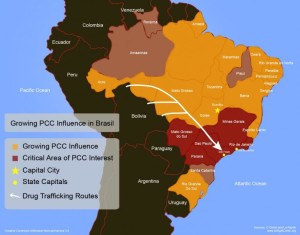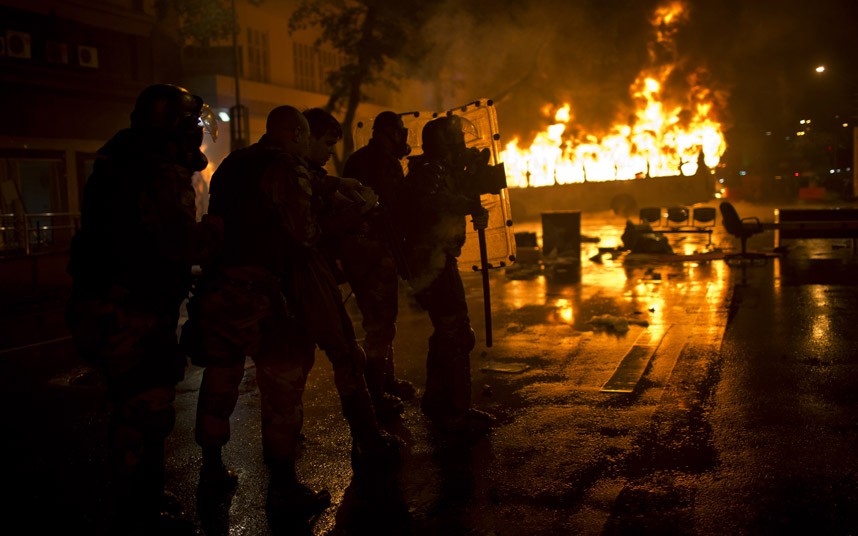In just under fifty-one days Brazil will host the Fifa World Cup in twelve different venues, supporting sixty-four football matches, and costing South America’s largest country roughly 11 billion dollars. This is significant due to the gross influx of tourists, teams and support staff, fans, and other visitors expected to either participate in, support, or enjoy the World Cup in Brazil. It is also significant because Brazil is the host of the 2016 Olympics, and any outcomes experienced as a result of the World Cup will significantly impact the outcome of the Olympic games held shortly thereafter.
Amidst Brazil’s attempts to prepare for the World Cup, relatively mild clashes with police forces in various favelas have erupted within the past few days. These clashes, while not directly related to anti-cup sentiment, highlight the variable state of security in even Brazil’s ‘pacified’ favelas and urban neighborhoods.
Brazil is working hard to maintain accountability over the innumerable tasks it must accomplish in order to successfully host both the World Cup and Olympics. However, issues such as significant protests, rioting, decreasing public support for the cup, and aggressive violent organized criminal organizations are threatening Brazil’s chances at success.
While Brazil was nominated to host the cup back in 2007, little progress has been made to prepare the infrastructure required to host such an event, let alone prepare for a second one in close temporal proximity. The country has also struggled with notable nationwide riots in urban areas against the cup, with under 50% of the public now expressing their support for the event.

According to reporting from the Guardian, urban areas throughout Rio de Janeiro–South America’s third largest metropolitan area–are experiencing significant and sporadic protests and demonstrations against the cup, a result of public frustration regarding massive corruption for building contracts and other preparations, coupled with aggressive armed retaliatory responses from security and military forces in troubled Rio favelas.
It is reasonable to understand the pressure experienced by Brazilian officials as they struggle to prepare the country for two very high profile events. Events such as the World Cup and Olympics, “upset the rhythms of [the country’s] politics and infrastructure investment…they clear thousands from their homes and virtually close down whole cities for a month.” As SOFREP has previously reported, Russia’s recent highly publicized Olympic preparations are evidence of the enormously taxing effort required for successful events.
In addition to preparing Brazil’s infrastructure and maintaining positive public perception regarding the benefits of hosting both the World Cup and Olympics, Brazilian officials must also work to quell any potential security threats originating from very powerful violent criminal organizations.

Reporting from late last year suggests that Brazil’s most powerful criminal organization, known by its Portuguese abbreviation PCC (“First Command of the Capital”), expressed possible intent to undermine security at the World Cup, the result of an alleged attempt made by the Brazilian government to crack down on cartel communications and organization within its extensive prison system. The PCC is present in the majority of Brazil’s states, and is roughly 13,000 strong.
The PCC, over half of whose members operate within the Brazilian prison system, has previously demonstrated itself to be a significant threat to domestic stability and security in urban areas, having organized numerous prison strikes, conducting targeted killings of police officers, and disrupted the lives of countless urban residents in both Sao Paolo and Rio.
The PCC is capable of coordinating activity from within the Brazilian prison system using mobile phones (oftentimes smuggled in using carrier pigeons carrying phone components, etc.), and can quickly provoke domestic unrest in controlled favelas based on several phone calls. Attacks using small arms, machine guns, and grenades are not uncommon, with more advanced tactics such as bombings, ambushes, and drive-by shootings also employed in previous years.
Times reports, “The carefully choreographed violence [of 2006] paralyzed Sao Paulo state and especially the state capital of the same name, a city of 19 million people that is Brazil’s financial and industrial center. With hysterical rumors of more attacks spreading via the Internet on Monday, schools, offices and businesses sent people home early and the megalopolis was brought to a standstill by traffic jams on Monday afternoon as frightened citizens rushed home. By evening, the city streets were eerily empty as people cowered in their houses.”
With the World Cup set to kick off on 12 June, Brazilian officials must work to maintain public favor and support for the event, in the hopes that aggressive domestic and local policing practices do not provoke violent criminal organizations such as the PCC into disrupting the security and stability of Brazil’s populated urban cup venues. The outcome of the World Cup will greatly affect the domestic populace’s perception and willingness to support Brazil’s follow-on high profile event in 2016, and will be very telling of any successes or failures that are yet to come as further preparations are made.
Thanks for listening.
Feature image courtesy of AP.










COMMENTS